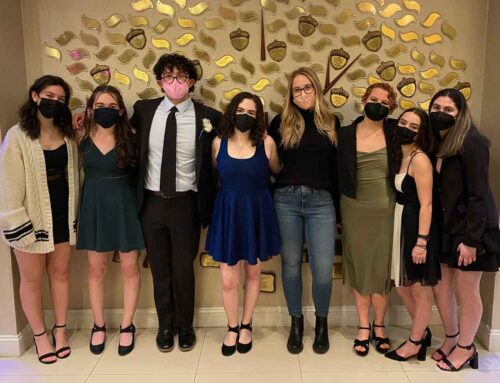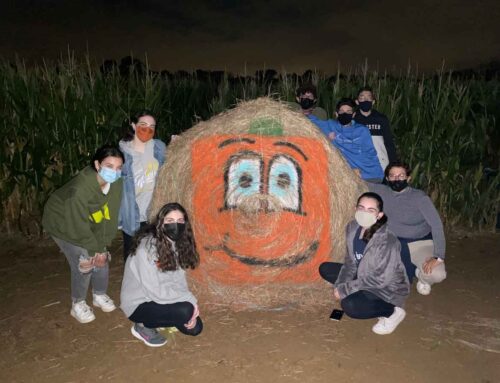It was a Tuesday night in February, I was scrolling aimlessly through the popular social media app Instagram, scanning the news, searching for new recipes, and googling the next pair of shoes I might buy. I never thought I would end up seeing the story that I came across. Now keep in mind, Instagram can be a positive platform to express yourself, whether that is through one’s personal life, highlighting current events, political views, and movements, or just a random puppy video that has you giving “heart eyes”. But it also can be a place of negativity, where body-shaming and cyberbullying can occur. USY’ers last month held an event at which Rabbi Wolkoff spoke about the dangers of anonymity on the internet, where trolling and conspiracy theories abound, leading to fanning the flames of severe anti-Semitism.
I’d like to think there can be more positive than negative forces at work when it comes to social media. Instagram enables ‘live’ streaming with musicians, fun photos, and creative ideas. It can bring long-distance family and friends together or showcase people’s amazing talents. The list is neverending. Truly it is the simple moments of people’s everyday life experiences that bring a smile to my face and ends my long workday on a positive note.
On this particular night and the days leading up to it, I see many of the young Jewish adults that I follow, posting on their Instagram story a picture of the fruit spread brand Bonne Maman. At first, I didn’t think anything of it and went about my day until I saw more and more people post it until my feed was flooded with this picture. Now I had to check out this post myself. We call this going ‘viral’. A professor at St. Johns Law School, Michael Perino makes a Twitter thread and says the following:
“Incident in a NJ Supermarket: At the supermarket today, I found a small, elderly woman standing in front of a high shelf holding @BonneMamanUS preserves. She was having trouble finding the flavor she wanted because the jars were set back on the shelf. She couldn’t read the labels. She could barely reach them. I offered to help. After I handed her the raspberry preserves, she thanked me, paused, and then asked, ‘Do you know why I buy this brand?’ I laughed and replied, ‘Because it tastes good?’ ‘Yes, it tastes good.’ She paused again. ‘I am a Holocaust survivor.’ This was not the conversation I expected on a Sunday grocery run. ‘During the war, the family that owns the company hid my family in Paris. So now I always buy it. And whenever I go to the store, my grandkids remind me, “Bubbe, don’t forget to buy the jelly’’. I told her that that was the best reason I ever heard to buy any company’s product. And then we both smiled behind our masks and went our separate ways.”
Now we have all heard the many accounts of non-Jews making extraordinary sacrifices to shelter or hide escaping victims during the Holocaust and this appears to be just another. But how entirely true is this particular anecdote? After scrolling for sources on the internet about this Bubbie’s tale and trying to find if there was any truth behind the story of the company Bonne Maman, nothing seems to appear besides articles about this specific Twitter thread. After reading the details from the popular website snopes.com, which verifies and debunks many internet posts, the article states “while it’s true that Bonne Maman did not exist in any official capacity until after World War II, the founders of Andros, the manufacturing company that owns Bonne Maman, Jean Gervoson and Pierre Chapoulart, can trace the history of their business back to the French village of Biars-sur-Cère during the Second World War” and while it’s not entirely clear, if a small town in France hid Jews or if it was a particular family with a jam company that hid Jews during the Holocaust “it seems that the Chapoulart family has been selling fruits and nuts in this small village since the 1910s” that would eventually turn into the jam company we know today (www.snopes.com). Additionally, an article from timesofisrael.com cites “many Jewish children who were being sheltered in Paris were moved to southern France after the Nazis invaded the capital city. Biars-sur-Cère is about a four-hour drive from Le Chambon-sur-Lignon, the French mountain town that is one of two municipalities honored collectively by Yad Vashem for its efforts to save Jews” (www.timesofisrael.com).
So was it even true that this Bubbie’s family was hidden in this small town in France during the Holocaust? It is up to you to interpret this story, deem it true or not and just look at the bright side of it all. A run-in at a grocery store, two smiles under a mask, and a viral Instagram post that made young Jewish adults’ hearts sing and feel good about buying a quality product. That is when I realized true or not, this is like any legend that has been passed on for years where the actual details have become fuzzy but it still makes anyone who reads it feel good. Now as you do your regular grocery shopping, head over to the peanut butter and jelly section. You never know what you are going to find.



